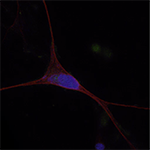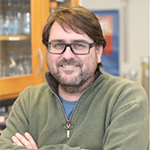News & Announcements
Read the latest news from Northwestern University Feinberg School of Medicine’s Department of Cell & Developmental Biology. The links below take you to articles where you can learn more about our faculty’s latest achievements, awards and honors.
 02.05.2026
02.05.2026A Northwestern Medicine study has shed light on one of the most intricate construction projects in biology: how cells build and coordinate the internal scaffolding needed to create a healthy egg, according to a recent study published in the Journal of Cell Biology.
 12.15.2025
12.15.2025The tiniest parts of the cell may provide new insights into challenging neurodegenerative diseases like amyotrophic lateral sclerosis (ALS). New research from Northwestern University has revealed a key mechanism underlying the development of motor neuron diseases, such as ALS, offering new insights into potential treatment options. This new finding published in the Journal of Neuroscience, comes from the lab of Vladimir Gelfand, PhD, and may help inform the treatment of ALS and other motor neuron diseases.
 12.09.2025
12.09.2025Constadina (Dina) Arvanitis, PhD, director of Feinberg’s Center for Advanced Microscopy, has been honored with the 2025 Royal Microscopical Society (RMS) Vice President’s Award for her outstanding leadership and service to the global scientific imaging community.
 10.31.2025
10.31.2025A Northwestern Medicine-led study has identified mutations in the gene CEP76 as a new cause of ciliopathies, shedding light on a complex group of disorders that affect multiple body systems, according to a study published in Science Advances.
 10.30.2025
10.30.2025Northwestern Medicine scientists have discovered how a specific transcription factor promotes genetic reprogramming and chemotherapy resistance in ovarian cancer cells, findings that may inform new targeted treatment approaches that inhibit this process and improve patient outcomes, according to a recent study published in The Journal of Clinical Investigation.
 10.16.2025
10.16.2025A Northwestern Medicine study has revealed a key mechanism underlying the development of motor neuron diseases, offering new insights into potential treatment options, according to a study published in the Journal of Neuroscience.
 10.13.2025
10.13.2025Yogesh Goyal, PhD, assistant professor of Cell and Developmental Biology, has been named a 2025-2028 Edward Mallinckrodt, Jr. Foundation Grant Fellow, which recognizes early-stage biomedical investigators engaged in basic and translational research that has the potential to make fundamental advances in biomedical science.
 09.24.2025
09.24.2025A novel monoclonal antibody treatment developed in collaboration with Northwestern Medicine scientists reduced inflammation and immune dysregulation in mouse models of sepsis, underscoring the antibody’s therapeutic potential in treating the disease, according to a recent study.
 09.17.2025
09.17.2025Brian Mitchell, PhD, is an associate professor of Cell and Developmental Biology. His laboratory aims to understand the integration of cell signaling and cytoskeletal dynamics on diverse developmental processes including centriole amplification, cell migration and cell polarity. He is also a member of the Robert H. Lurie Comprehensive Cancer Center of Northwestern University and the Skin Biology and Diseases Resource-Based Center.
 09.16.2025
09.16.2025Scientists at Feinberg are reshaping scientific understanding of the cell’s tiniest components—structures once thought to be static, now revealed to be dynamic engines of cellular life.
 08.29.2025
08.29.2025A Northwestern Medicine study has uncovered new insights that may aid in understanding and potentially treating one of the most common and aggressive forms of non-Hodgkin lymphoma, according to findings published in Science Advances.
 08.26.2025
08.26.2025A team lead by Northwestern scientists has found that paraspeckles, found in the nucleus of many cells, form differently than previously thought, which may aid in the design of future cancer drugs.
 06.24.2025
06.24.2025Northwestern Medicine scientists have discovered a previously unknown process used by epithelial cells to alleviate epithelial tissue crowding and avoid cell damage and loss, according to a recent study published in Nature Communications.
 04.28.2025
04.28.2025Northwestern Medicine scientists have shed new light on the inner workings of some of the finest filament cellular structures, according to a study published in the Journal of Cell Biology.
 04.16.2025
04.16.2025Scientists have uncovered new details about cellular filaments that play a critical role in wound healing, according to a study published in the Proceedings of the National Academy of Sciences.
 03.20.2025
03.20.2025Northwestern Medicine investigators have uncovered new insights into how intercellular “glue” functions to enable interactions between cells, as detailed in a study published in Nature Communications.
 03.17.2025
03.17.2025Northwestern Medicine investigators have identified novel mechanisms regulating the development of the spinal column during embryonic development, findings that could inform new treatments for congenital scoliosis and other related birth defects.
 02.24.2025
02.24.2025Northwestern Medicine investigators have discovered unique genetic and structural changes in endothelial cells in the brain after disrupting the blood-brain barrier, which may inform new therapeutic targets that promote blood-brain barrier repair after neurovascular injuries, according to a recent study.
 02.23.2025 | Northwestern Medicine magazine - 2025, Issue I
02.23.2025 | Northwestern Medicine magazine - 2025, Issue IA new initiative between Northwestern University Feinberg School of Medicine and McCormick School of Engineering aims to establish shared research "neighborhoods" on the Chicago campus, fostering interdisciplinary collaboration at the intersection of medicine and engineering.
 02.20.2025
02.20.2025Northwestern Medicine investigators have discovered new mechanisms underlying cellular adhesion and repair, findings that could inform the development of new therapeutics that boost cellular repair after tissue injury, according to a recent study published in the Journal of Cell Biology.